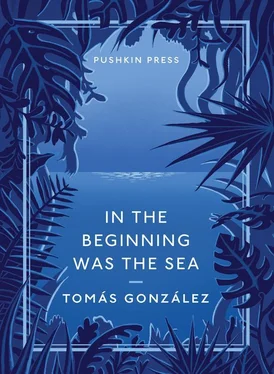When Elena was out on the veranda, Gilberto would stop by only for a moment, offer them a drink and then take his leave.
ONE SATURDAY NIGHT, J. told Gilberto that he had decided to go with him to town. The following morning, just after sun-up, he was woken by the sound of hooves, the snorting of horses and Gilberto’s voice calling him.
“Don’t bother saddling a horse for me, Gilberto,” he called back from the bed. “I’ll walk.” He took a shower, washed down the fried plantains Mercedes brought with black coffee, then set off on foot behind the horses.
The two men walked some distance along the beach. The sea was calm and blue, the air was cool. J.’s shoes sank into the sand and his calves began to cramp. Gilberto rode slowly so that J. could keep up.
They came to a spot where the mountain tumbled to the sea in a sheer cliff. This was the northernmost boundary of the finca . They turned off the beach and headed up a steep, overgrown slope.
“Whenever you like, jefe , you just say the word and you can have the horse,” said Gilberto, seeing J. clutching at the surrounding plants to keep his balance. The dense forest was filled with bird calls. Feeling tired, J. agreed to ride for a while. Gilberto helped him into the saddle and then walked behind.
They came to the top of the hill. To their left, the mountain and the forest rose away; to their right, a step path wound down towards the sea. They could hear the muffled roar far below. Gilberto managed the descent as effortlessly as he had the climb. The trail, though longer, was broader now and not as steep, which made the going easier.
Suddenly, the mountain levelled off and the path ahead became less overgrown. The dense forest gave way to a banana plantation. Weaving between the banana plants, the path came to a house where three scrawny dogs were barking in the front yard.
“ Hola , Don Eduardo,” Gilberto called and, when no one replied, added, “He’s probably healing someone, or trying to convert someone…”
Don Eduardo, like J., was from Antioquía, and suffered from a mild mystical form of madness. Gilberto’s voice was gently mocking as he told the man’s story, sprinkling the tale with interminable anecdotes that J. found tedious. To his mind, any man capable of applying plasters and giving injections was a boon to the area, even if he was best friends with God Almighty.
The plantation was bordered by a line of coconut palms and, beyond them, they came once more to the sea. Here, the coastline curved into a pair of claws to create a sweeping natural harbour some ten or fifteen kilometres wide. At the far end of the bay, J. could see the roofs of the town. Aside from the roofs, he could just make out a number of canoes and various piles of wood on the shore and, some two hundred metres out to sea, two ships floating on the glassy waters. Just then, like a waterbug, a canoe dropped away from one of the ships and moved slowly towards the strand.
J. climbed down from the horse, called Gilberto and handed him the reins. The man slung them over his shoulders and they walked on together. The ships arrived three times a week to collect timber, coconuts and passengers, Gilberto explained, though the timetable depended on the weather.
“I remember once it took us ten hours just to get to Turbo,” he said.
Ten minutes later, they passed the cemetery. Some fifty graves were scattered over an area that looked more like a part of the beach than a separate plot of land. Most of the graves were marked with wooden crosses, some boasted concrete tombstones, two or three had vaulted mausoleums, but the shifting soil had given way under the weight, the concrete had fractured, and the tombs, like shipwrecks, lay half-buried in the sand.
Even so, the cemetery did not seem sinister. Being so close to the sea, it was frequently flooded during high tides, which left trails of foam. The joyous way in which vegetation crept over the crosses and the tombstones and pushed through cracks in the concrete, the sight of crabs appearing suddenly from sandy tunnels dug into the graves, and iridescent lizards basking in the sun seemed to J. to represent the enduring triumph of life over death. Oblivious to the fate foreshadowing his own bones, it occurred to J. that of all the cemeteries he had ever seen, this particular one terrified him least.
They left the cemetery behind and arrived in the town fifteen minutes later.
There were four streets, some fifty houses, and a population of no more than five hundred. A broad stretch of beach served as the town square; here were the piles of wood and the beached canoes J. had seen from the distance. There was also an old truck which had obviously just arrived since he had not noticed it earlier. This, and a similar old rattletrap, were the only motor vehicles in the area. The truck looked as though it had been used during an evacuation, an invasion or some massacre. The bodywork was pitilessly eaten away by rust — the doors had gaping holes, the bumpers were corroded — and had recently been hand-painted a vivid red. The brutish, warlike shape of the truck contrasted with the bright, jolly paint job, giving it a fantastical appearance. “This is how we in the tropics repurpose the grey cast-offs sent to us by shitty First World countries,” thought J.
Passengers were gathered around the truck waiting for the loading to be completed so they could climb aboard. Other people stood in shop doorways drinking beer. J. could feel eyes boring into the back of his neck, something he accepted calmly and with a certain vanity. Some of the children blatantly stared at him.
“What are you looking at?” he asked one of them.
The little black boy answered with a smile and J. flashed back a fleeting grin that seemed to please the child.
They bought the groceries in a lean-to shop which adjoined a house, with a wooden counter and, behind it, wooden shelves laden with foodstuffs which ran the length of the walls. The shop smelt of plastic and leather. Behind the counter sat the owner, a narrow-shouldered young man with a sallow complexion and a large pot belly, who wore his shirt rucked up over his chest in an effort to combat the sultry heat that gusted in from outside. The owner’s name was Juan, a man famous for buying stolen goods. J. found him simultaneously cynical and obsequious. He was helped out in the shop by his wife, a languid, overweight, proud woman of about thirty with pale olive skin and a beautiful face. She exhaled a breath of sensuality like the miasma of a flowering swamp.
Gilberto was an old hand at shopping and J. scarcely had time to drink four beers before the groceries were loaded onto the packhorse. J. found everything outrageously expensive. This may have been the moment when he first considered opening his own shop on the finca .
LESS THAN two months after their arrival, J. found himself obliged to go back to Medellín.
“I’ll head off on Tuesday, hermana ,” he told Elena, “I’ll be leaving you in charge of everything.”
“No problem,” she said without a flicker of hesitation.
J. gave her some advice, talked to Gilberto about the work that needed to be done in his absence, and set off.
In Medellín, disaster awaited him. Before he and Elena moved to the sea, J. had entrusted his money to a relative to invest, planning to live off the interest until he could find a way of making the finca profitable. A number of people had advised him to be wary. The man had a chequered history — something J. knew, but managed to overlook — and more than once he had been sued for breach of trust. There were rumours that he was a professional swindler. But J. ignored such stories. Persuaded, perhaps, by the fact that the man was a relative and tempted by the exorbitant interest rates he was offering, J. had lodged a meagre three hundred thousand pesos with a bank and handed over the rest to be invested. It proved to be a terrible mistake. When he reached Medellín, he discovered that the relative had declared himself bankrupt in suspicious circumstances. In blunter terms, he had robbed J. blind. There were bitter arguments, lawyers, legal battles, but in the end J. lost everything. After wrangling for a month and a half, J. realized that the finca and the three hundred thousand pesos in the bank were now his sole means of survival. He sent a letter to Elena with Don Carlos, who happened to be heading to Urabá, explaining that he would have to stay in town another fortnight; he told her not to worry, that everything would be fine.
Читать дальше










